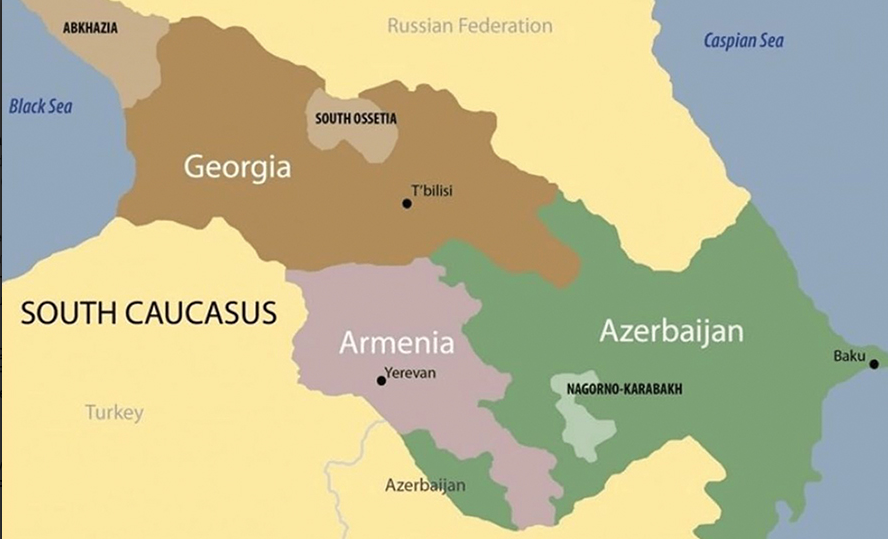by Benyamin Poghosyan
The 2020 Nagorno-Karabakh war and the onset of the Russia-Ukraine conflict in February 2022 have dramatically disrupted the status quo in the South Caucasus, thrusting the region into the center of regional and global power rivalries. To varying degrees, Russia, the United States, the European Union, Turkey, Iran, Israel, France, India, China, and Pakistan are involved in the South Caucasus, creating a complex nexus of overlapping and diverging interests shaping the region’s geopolitical present and future. In recent years, the United States and the European Union have increased their presence in the South Caucasus. However, potential change in leadership in Washington and the shifting priorities in the forthcoming EU legislative cycle could significantly alter their engagement in the region.
The Biden Administration has pursued active engagement in the South Caucasus. The United States has been one of the main mediators in Armenia-Azerbaijan negotiations, organizing several meetings between Armenian and Azerbaijani foreign ministers in Washington from 2022-2024 and the meeting between Prime Minister Nikol Pashinyan and President Ilham Aliyev in February 2023 in Munich. US engagement with Armenia has also increased, aligning with the administration’s broader efforts to support democracy worldwide. The confrontation between US and Russia has further influenced their policy in the region, as Washington views the Armenia-Azerbaijan peace process and Armenia-Turkey normalization as a tool to reduce the South Caucasus and Central Asian countries’ dependency on Russia.
With the upcoming US presidential elections in November 2024, the potential impact on American foreign policy in the South Caucasus cannot be overstated. Should Kamala Harris, the candidate of the Democratic party, win, it is unlikely that US foreign policy will undergo drastic changes, although sustained interest in the South Caucasus is not guaranteed.
Read also
In the event of a second Trump presidency, the situation becomes more uncertain. Many experts find assessing Trump’s foreign policy challenging, particularly his views toward the South Caucasus. However, a prevailing perception is that the US involvement in the South Caucasus would likely decrease under a Trump Administration. The key drivers of the Biden Administration’s approach — support for democracy and countering Russia — may not be as relevant to a Trump Administration.

Benyamin Poghosyan
The South Caucasus, including Armenia, should be prepared for the possibility of reduced US involvement. This change could occur swiftly if Trump returns to the White House in January 2025, necessitating proactive preparation from the region.
The European Union has increased its involvement in the South Caucasus following the 2020 Nagorno-Karabakh war. Bogdan Aurescu, Romania’s foreign minister, along with Alexander Schallenberg, Austria’s foreign minister, and Gabrielius Landsbergis, Lithuania’s foreign minister, conducted a regional tour of the South Caucasus from June 24 to 26, 2021 as special envoys of Josep Borrell, the EU’s High Representative for Foreign Affairs and Security Policy. The EU Commissioner for Neighborhood and Enlargement, Olivér Várhelyi, visited the South Caucasus from July 6 to 9, 2021, to discuss EU relations with the region. Additionally, President of the European Council Charles Michel visited the South Caucasus from July 17-19, 2021.
Before the 2020 Nagorno-Karabakh war, the European Union had no direct involvement in the Armenia-Azerbaijan negotiation process. In late 2021, the EU established the Brussels format of negotiations. Armenian and Azerbaijani leaders held six meetings facilitated by President of the European Council Michel (in December 2021, April, May, and August 2022, May and July 2023). Additionally, two meetings took place on the sidelines of the European Political Community summits (in October 2022 and June 2023). As a result of these meetings, Armenia and Azerbaijan stated their recognition of each other’s territorial integrity per the 1991 Alma-Ata declaration, and the EU launched a short-term observer mission in Armenia in October 2022. A subsequent two-year mission began its activities in February 2023.
The EU and Armenia initiated a dialogue to strengthen and deepen EU-Armenia relations after the fallout of Nagorno-Karabakh in September 2023. In February 2024, they launched work on the EU-Armenia New Partnership Agenda. The EU agreed to start a visa liberalization dialogue and provided 10 million euros in support through the European Peace Facility. The EU also significantly increased its engagement with Georgia, granting Tbilisi candidate status in December 2023.
However, the EU’s future role in the region remains unclear. The EU needs a more cohesive regional policy as different member states pursue varying objectives. This divergence of interests and nature of the relationship with the three regional countries has hindered the EU from developing a unified strategy for the South Caucasus, as APRI Armenia argued in its research report.
Moreover, Ursula von der Leyen’s political guidelines for the next European Commission (2024-2029), which emphasize the Western Balkans, Ukraine and Mediterranean region, exclude the South Caucasus. This may signal reduced EU interest in the region. Following the adopting of the foreign influence law in Georgia, growing tensions with the Georgian Dream government could further alienate the EU from the region.
As a result, there is a likelihood that both the US and the EU involvement and interest in the South Caucasus will decrease in the upcoming years compared to their active engagement of 2021-2024. The question then arises as to which powers would benefit from this possible vacuum. This vacuum could be filled by Russia, Turkey, and Iran, positioning them as the primary powers shaping the region’s future.
This may align with Azerbaijan’s strategic interests, as Baku does not want to see growing Western presence in the region, while relying on its alliance with Turkey, increasing cooperation with Russia, and establishing strategic partnership with China. It could create complications for Georgia, which, despite growing tensions with the West, does not want to cut all ties with the US and the EU, viewing them as partners for its balanced foreign policy.
This future configuration could be challenging for Armenia to continue pursuing its “pivot to world policy,” as coined by Armen Grigoryan, secretary of the Security Council during the 2024 APRI Forum. The Armenian government should prepare for this scenario in its contingency planning by elaborating a strategy of interaction with the global South, activating contacts with the new leadership in Iran, and reaching out to Western partners for better understanding of the future of their policy in the region beyond 2024.






















































